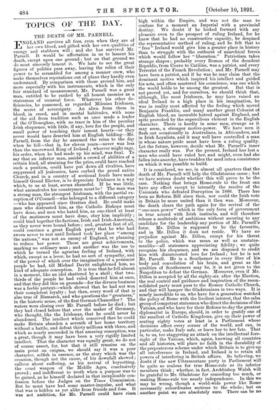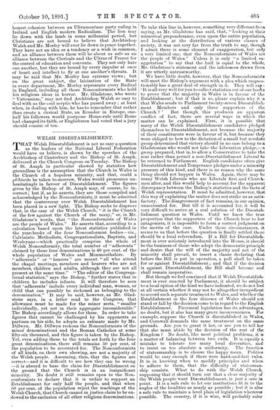TOPICS OF THE DAY.
THE DEATH OF MR. PARNELL.
'ENGLAND survives all foes, even when they are of her own blood, and gifted with her own qualities of energy and stubborn will ; and she has survived Mr. Parnell. It would be affectation in us to lament his death, except upon one ground ; but on that ground we do most sincerely lament it. We hate to see the great figures of politics pass away, leaving the relics of their power to be scrambled for among a meaner crew, who make themselves reputations out of plans they hardly even understand. By comparison with those around him, and more especially with his instruments, which is the only fair standard of measurement, Mr. Parnell was a great man, entitled to be ranked by all honest enemies as a • statesman of unusual force. Whatever his other de- ficiencies, he possessed, as regarded Milesian Irishmen, the secret of sovereignty. An alien from them in blood, in creed, and in mental habitudes, with none of the aid from tradition such as once made a leader of the O'Donoghue, with no trace in him of the peculiar Irish eloquence, with little, if any, love for the people, and small power of touching their inmost hearts—or they never would have deserted him at English bidding—Mr.
Parnell, from the day he assumed the reins to the day when he fell—that is, for eleven years—never was less than the uncrowned King of Ireland ; whoever might rage, his order, when he had made up his mind, was final. To say that an inferior man, amidst a crowd of abilities of a certain kind, all straining for the prize, could have reached such a position, could have put down all rivalries, have suppressed all jealousies, have curbed the proud native Church, and in a country of sectional feuds have made himself Grand Elector, is to depreciate Irishmen in a way which, to us at least, seems shameful. If he was little, what animalcules his countrymen must be ! The man was a strong man, the strongest Irishman, with the partial ex- ception of O'Connell—who belonged to a different category —who has appeared since Grattan died. He could make men who distrusted him, as the Catholic Bishops must have done, and men who hated him, as one-third at least of the mutineers must have done, obey him implicitly ; could bind together the factions, Irish and Irish-American, as they never were bound before ; and, greatest feat of all. could convince a great English party that he who had sworn never to rest until Ireland took her place "among • the nations," was not an enemy of England, or planning to reduce her power. Those are great achievements, marking no ordinary man ; and another was the use to which be turned the agrarian feeling of Ireland, with which, except as a lever, he had no sort of sympathy, and of the power of which over the imagination of a pessimist people he had, till Michael Davitt enlightened him, no kind of adequate conception. It is true that he fell almost in a moment, like an idol shattered by a shell ; that two- thirds of the people he had ruled deserted him at once, and that they did this on grounds—for the divorce business was a feeble pretext—which showed that, he had not won their completest loyalty ; but then, every word of that is also true of Bismarck, and who questions the "greatness," in the historic sense, of the first German Chancellor ? The waters were closing over Mr. Parnell before he died ; but they had closed before that over the maker of Germany, who thought, like the Irishman, that he could never be abandoned. The intellect which conceived that he could make Britain abandon a seventh of her home territory without a battle, and defeat thirty millions with three, and which so nearly succeeded in that amazing conception, was a great, though it may have been a very rigidly limited intellect. That the character was equally great, we do not of course assert, for, but that it still remains on the main point an enigma, we should say it was a poor character, selfish in essence, as the story which was the occasion, though not the cause, of his downfall showed ; callous about suffering, as his revival of boycotting, the cruel weapon of the Middle Ages, conclusively proved ; and indifferent to truth when a purpose was to be gained, as he himself declared in that inexplicable con- fession before the Judges on the Times Commission. But he must have had some master-impulse, and what that was is hidden as yet alike from friends and foes. It was nut ambition, for Mr. Parnell could have risen high within the Empire, and was not the man to confuse for a moment an Imperial with a provincial destiny. We doubt if he looked forward with any- pleasure even to the prospect of ruling Ireland, for he knew that he had no constructive capacity, he despised the representative method of ruling, and he felt that to "free" Ireland would give him a greater place in history than to struggle with the outburst of anarchical forces. which would follow her "liberation." Patriotism takes strange shapes ; probably every Roman of the decadent Republic, from Cicero to Cattiline, was a patriot, and every Terrorist of the French Revolution ; and Mr. Parnell may- have been a patriot, and if he was he may claim that the dominant motive which inspired his intellect and guided his acts, and often mastered his conscience, was one which the world holds to be among the greatest. But that is not proved yet, and for ourselves, we should think that, although, like most Irishmen, he may have raised an ideal Ireland to a high place in his imagination, he was in reality most affected by the feeling which moved Benjamin Franklin, and many another great Colonist of English blood, an incurable hatred against England, and spite provoked by the supercilious element in the English character. There is hardly in some men, strange as it may seem, a stronger motive-power. We have seen it flash out occasionally in Australians, in Africanders, and in Irish Loyalists, and it may well have controlled a man in whose nature pride must have been a ruling quality. Let the future, however, decide what Mr. Parnell's inner character really was. For the present, Ireland has lost a man who could have ruled her, and might, even had she fallen into anarchy, have trodden the mud into a consistence on which it was possible to build.
It is considered, we see, in almost all quarters that the death of Mr. Parnell will help the Gladstonian cause ; but we have serious doubt whether this will prove to be the case. Nothing that brings Home-rule to the front can have any effect except to intensify the resolve of the Unionists who defeated Disruption in 1886. There has been no Reform Bill since then, nor could the Irish vote in Britain be more united than it then was. Moreover, the death clears the path again for the revival of the "one-man power" which is the only form of government in true accord with Irish instincts, and will therefore release a multitude of ambitions without securing to any candidate for the leadership any portion of Mr. Parnell's force. Mr. Dillon is supposed to be the favourite, and in Mr. Dillon it does not reside. We have no prejudice against Mr. Dillon, except for his threat to the police, which was mean as well as unstates- manlike—all statesmen appreciating fidelity ; we quite recognise his eloquence, and we are disposed to credit him with disinterested love for Ireland ; but he is not Mr. Parnell. He is a Southerner in every fibre of his body and convolution of his brain, and great as the qualities of Southerners may be, it is not given to the Neapolitan to defeat the German. Moreover, even if Mr. Dillon is accepted by all the eighty-six after the Election, the real control and guidance and inspiration of the recon- solidated party must pass to the Roman Catholic Church, and that will hamper the Gladstonians in two ways. It is nearly incredible to us, who have for a generation watched the policy of Rome with the liveliest interest, that the calm group of competent statesmen who direct the decisions of the Vatican, and who have for their Referee to-day the greatest diplomatist in Europe, should, in order to gratify one of the smallest of Catholic Kingdoms, give up their power of seating eighty votes at least in a Parliament whose decisions affect every corner of the world, ad can, in particular, make Italy safe, or leave her to her fate. That is, to us, too staggering an attack on the intellectual fore- sight of the Vatican, which, again, knowing all countries and all histories, will place no faith in the durability of • the preposterous scheme under which Britain is to give up all interference in Ireland, and Ireland is to retain all powers of interfering in British affairs. So believing, we doubt if the new Ultramontane party in Parliament will - be quite so zealous for true Home-rule as its inferior members think ; whether, in fact, Archbishop Walsh will be grateful to Mr. Gladstone for conceding too much, or making Home-rule too nearly independence. In this we may be wrong, though a world-wide power like Rome necessarily subordinates sections to the whole ; but on another point we are absolutely sure. There can be no honest cohesion between an TJltramontane party ruling in Ireland and English modern Radicalism. The lion may lie down with the lamb in some millennial period, but Christians are not bound to believe that Archbishop Walsh and Mr. Morley will ever lie down in peace together. They have not an idea or a tendency or a wish in .common, and an alliance between them will be about as safe as an alliance between the Clericals and the Ultras of France for the control of education and convents. They not only hate one another, but they are bound by every impulse at once of heart and intellect to fly at one another's throats. It may be said that Mr. Morley has extreme views ; but on the great subject, the laicisation of the State in every department, Mr. Morley represents every Radical in England, including all those Nonconformists who hold his religious ideas in horror. Mr. Gladstone, who wrote " Vaticanism," may not find Archbishop Walsh so easy to deal with as the cool sceptic who has passed away ; at least when, in dealing with him, he has to remember that rather than create a clerical State, an Ecuador in Europe, one- half his followers would postpone Home-rule until Rome had changed its faith, or Englishmen had voted that a jury should consist of ten.























































 Previous page
Previous page